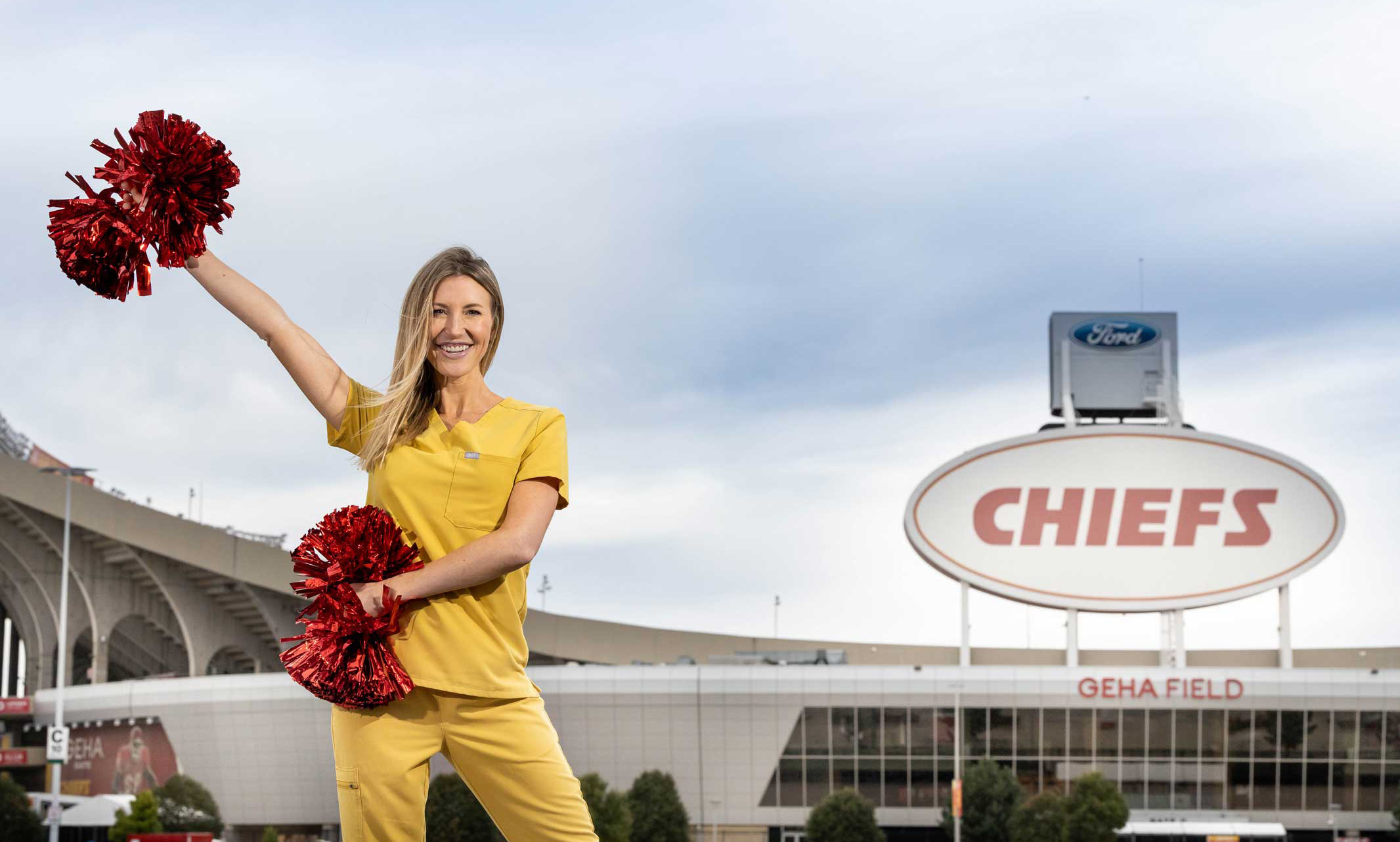
School of Dentistry alumni share a unique link to the Kansas City Chiefs
The connection between cheerleading and the field of dentistry is quite clear for Ashley Hobbs (B.S.D.H. ’11). As a member of the Kansas City Chiefs cheerleading squad, she used her athletic skills to pump up crowds and keep them smiling at Arrowhead Stadium. Now, as a dental hygienist, she’s still focused on bright smiles – but she’s using a different set of skills to motivate and engage with her patients.
“You are their oral health coach,” Hobbs said of her patients. “As a cheerleader, you bring positivity, and you lift everyone up. I do the same for my patients. You are encouraging them to not only improve their oral health, but their overall quality of life.”
Hobbs is a pediatric dental hygienist, a proud alumna and a faculty member at UMKC. And from 2013 to 2016, she was also a Chiefs cheerleader, a unique experience she shares with other School of Dentistry alumni. The school counts several former Chiefs cheerleaders and at least one Chiefs drumline member among its alumni ranks.
These alumni have taken valuable lessons into their careers from their days on the sidelines. For Hobbs, Tim Albright (D.D.S. ’21) and Kathryn Teruya (D.D.S. ’22), the experience reinforced the importance of discipline, teamwork and putting people first.
Smiles in the Crowd and in the Chair
As a member of the Chiefs drumline, the KC Rumble, from 2016 to 2020, Albright was energized by the crowd. Now he gets that feeling from the gratitude of his patients. Whether it’s an undetectable filling or a straightened Invisalign finish, the smiles of his patients take him back to his days drumming in front of 70,000 screaming fans.
“I still experience euphoria whenever I have a solid crown,” Albright said. “Your patient is happy, they’re gleaming. It’s the same look I would get playing music for people. It keeps me going.”
Time in front of fans was not limited to game day. The Rumble and the cheerleaders had public appearances throughout the week. These opportunities to connect with people prepared them for future chairside interactions.
“Everybody has something they’re passionate about. With people who may be apathetic about their dental care, you’re trying to find what sparks them,” Albright said. “Once you find their icebreaker, you’re able to make that connection.”
Public appearances also provided Hobbs an opportunity to hone her pediatric skills. There were often kids excited to meet the cheer squad. Those conversations laid the groundwork for the six years she’s practiced in pediatric dentistry.
“Just learning how to interact with them,” Hobbs said. “I took everything that I learned from the Chiefs and applied it to my work in pediatrics.”
Discipline in Dance, Drumming and Dentistry
Whether drumming or dancing, a common thread emerges: discipline. All three credit the discipline required to succeed in their respective crafts with helping them manage the rigors of dental school.
That discipline was formed back in seventh grade for Albright, when he took up drumming and would practice until midnight every night. Dental school changed his perspective, however.
“I don’t think you need 10,000 hours to master something anymore,” Albright said. “I learned in dental school about the importance of deliberate practice.”
Discipline is also essential in cheerleading because of the demanding schedule. For Hobbs, cheering for the Chiefs felt like a full-time job on top of her full-time job as a hygienist. She had weekly appearances and daily five-hour practices in addition to long game days. She also had fitness testing, mandatory training sessions and extra time in the gym.
“I was newly graduated and new to the dental hygiene profession,” Hobbs said. “It was a struggle juggling both lives.”
Hobbs and Teruya said their love of dance drove them to take on the arduous schedule. Hobbs has a degree in dance and lived in New York, performing with professional dance companies before coming to UMKC. She taught dance while in dental hygiene school.
Dance has been a presence in Teruya’s life since she was three. A former Miss Hawaii (she was crowned in 2017), she’s an experienced dancer in hula, ballet and jazz. She credits the perfectionist nature dancers have to her success in dentistry.
“We always joked on our (Chiefs) dance team that a lot of us are type-A people,” Teruya said. “That correlates well to dentistry. We like things orderly and in a particular way.”
Although the pull toward dance was strong for both Hobbs and Teruya, their priority was always UMKC. Hobbs was laser-focused on becoming a full-time faculty member. Teruya juggled many activities while at the dental school, including the Chiefs cheer squad from 2020 to 2021. But the pursuit she valued most was that of future dentist.
“First and foremost, I moved from Hawaii to Kansas City to be a dental student,” she said.
Team and Community in the Dental Practice
The cheerleading schedule was grueling, Hobbs and Teruya admitted. But they loved being part of a team of women who lifted each other up, both literally and figuratively.
“It’s much more than just dancing on the sidelines,” said Hobbs. “It became a sisterhood where you were supportive of one another and you were in it together.”
During Teruya’s time at UMKC, her two teams joined together for TeamSmile, an event at GEHA Field at Arrowhead Stadium with Chiefs players, coaches and cheerleaders during which UMKC students and faculty provide dental care to underserved children. She got to participate as both a student and a cheerleader.
“It was one of my favorite memories,” Teruya said. “It was really special to be able to celebrate my classmates and connect with the kids.”
The moments standing in front of a crowd at “the loudest stadium in the world” may now be only memories for Hobbs, Teruya and Albright, but those memories serve a purpose. The discipline formed, strong bonds made and feelings that come with energizing a crowd have all made an impact on who they are as dental professionals. The dedication, sense of community and drive to help people connects the worlds of cheer and dentistry.
“Every single year a student will ask, ‘were you really a Chiefs cheerleader?’ and every time I wonder, ‘when will this not be a thing anymore?’” Hobbs said. “But those are some of the best memories of my life and I wouldn’t change it.”
Dec 05, 2022
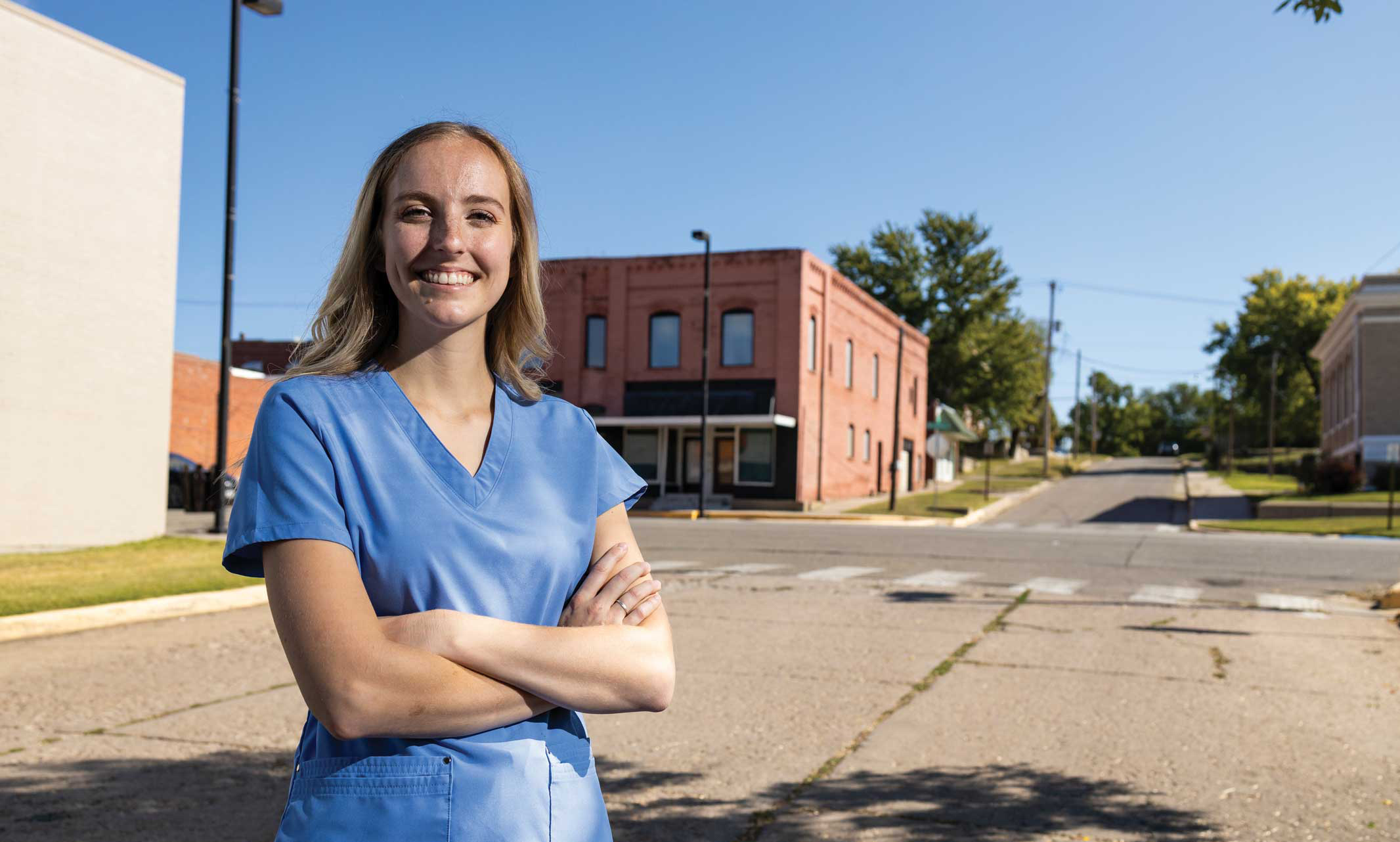
UMKC School of Dentistry and alumni rising to meet the need in rural communities
Only 10 of the 219 counties that make up Missouri and Kansas have enough dental care providers, according to the Rural Health Information Hub. The majority of these dental deserts are in rural communities, which, historically, face challenges in recruiting health-care professionals.
The UMKC School of Dentistry is working to end this dental drought through a number of measures, including a new scholarship aimed at students from rural areas. The scholarship is enabling its first recipient, third year dental student Katie Roe, to fulfill her dream of owning a practice back in her hometown.
Hometown homecoming
Roe’s path to a dental career began in middle school. She and her mother visited their town’s only dentist, Lynn Otte (D.D.S. ’79), to discuss what kind of opportunities the field of dentistry could hold for a young girl from Herington, Kansas.
Through the years, Roe and Otte formed a connection and began discussing plans for Roe to eventually take over Otte’s practice. Roe had always envisioned owning a practice in Herington, but was considering working for another dentist while she paid off her school costs. That is, until she found out she’d be the first recipient of the Dan Root Memorial Scholarship. Now she plans to buy the practice after she graduates.
“I still remember that first discussion we had about dentistry,” Otte said. “And Katie’s just kept working in that direction ever since, which has been wonderful.”
The scholarship was established by Glenda Root in honor of her late husband, Dan, who founded Root Dental Laboratory, where he worked closely with many UMKC dentistry alumni. The transformational scholarship will cover a full year of Roe’s tuition. It doesn’t end with her. Thanks to the Roots’ donation, UMKC estimates it will be able to award three or four full-tuition scholarships annually, beginning next year. The scholarships will go to students with a demonstrated financial need, with preference given to students from rural areas.
“This scholarship allows me to focus on what’s most important to me — helping people,” Roe said. “It doesn’t just impact me; it impacts my immediate family, my future family, the patients. The ripple effect of this scholarship is amazing.”
Roe has long been dedicated to her hometown of Herington, about 50 miles south of Manhattan, Kansas, population 2,129. Her loyalty was solidified when her brother was diagnosed with a serious health issue and the people in Herington rallied behind her family.
“Everyone in town stepped up to help us in our time of need,” she said.
Encouraging rural Roos
Richard Bigham, assistant dean for student programs at the UMKC School of Dentistry, said he hopes lifting some of the financial burden will make scholarship recipients more willing to return to their rural roots and fill the need. Many students worry whether they can maximize their earning potential in rural areas.
According to Dean Steven Haas, practices in rural areas show lower gross income compared to urban practices. The flip side is that urban practices can suffer greater losses and failure rates due to overhead costs and competition, among other things. Haas said that a newly opened rural practice can be financially successful in one year and subsequently generate a stable earning for a dentist.
These shortages are not limited to dentistry, as the entire health-care field is grappling with a maldistribution of health-care providers. Beyond scholarships, Haas said the school has incorporated courses into its curriculum that explore some of the challenges rural populations face, such as the Community-Based Dental Education course.
The school is also working to get students out to rural areas through some of these courses, particularly through externships at community health centers across Missouri and Kansas. According to Melanie Simmer-Beck (R.D.H. ’94, Ph.D. ’13), each year, about half of the third-and fourth-year students who take the class choose health-care centers based in rural communities, and a number of them come back with job offers in-hand.
Simmer-Beck is both the chair of Dental Public Health and Behavior Sciences and the director of the UMKC Students Training in Academia, Health and Research (STAHR) Dental Scholars program at the School of Dentistry. STAHR is a pipeline program that addresses shortages in both rural and urban areas of Missouri. The program also includes the schools of medicine and pharmacy, and focuses on increasing the number of students from economically and educationally disadvantaged backgrounds, while helping students better prepare for the rigors of health sciences programs.
“The dental school has always been committed to seeking out students who come from rural areas, hoping they have a strong desire to return and give back,” Haas said. “Scholarships like the Dan Root Memorial Scholarship are an amazing act of philanthropy.”
Ample opportunity for alumni
Justin (D.D.S. ’07) and Sadie (B.S.D.H. ’05) Ebersole began mapping out their plans for practicing in a rural area on their first date, when they were students at the UMKC School of Dentistry.
“He told me, ‘I’m a small-town boy and I’m going to a small town in Kansas, so if you want to live in the city, you should probably move on,’” Sadie said.
They’ve made for a great “small town team” ever since. The Ebersoles own Parsons Dental Care in Parsons, Kansas. Justin is the practicing dentist. Sadie started as a hygienist, but has transitioned to office manager, while still practicing one or two days a week.
The couple settled on Parsons, near Justin’s family farm in neighboring Chautauqua County, because they found a practice that met all their criteria. After graduation, they joined the practice in Parsons and acquired sole ownership in 2020.
“We did some serious research when evaluating practices,” Justin said. “I would strongly encourage people to look at all the numbers: how many active patients, how many dentists are in that town and the surrounding area.”
The Ebersoles agree the most rewarding part of owning a small-town practice is getting to know their patients. In the years they’ve been in Parsons, they’ve been able to watch families form and kids grow up.
“Those bonds that you build are so cool,” Justin said. “I see great-grandparents, grandparents and all the way down.”
It also doesn’t hurt that business is good. The Ebersoles hope practitioners realize the significant need in these rural areas also means opportunity.
“We have no need for an advertising budget,” Justin said. “There are more patients than you can ever handle. I never imagined how well we would do. That’s been a huge bonus.”
While it may be a bonus, Sadie stresses the decision to practice in a rural area shouldn’t only be a financial choice. According to her, a practitioner considering a rural setting needs to feel a personal connection to the area. The Ebersoles love how immersed they are in the Parsons community.
“I would just encourage people to maybe step outside their box and go to some of these places that are rural and are looking for a dentist. Just give it a chance,” Justin said. “Be open minded about all the benefits of living in a small town.”
Dec 01, 2022
Students are recognized for their outstanding scholastic performance, community leadership and service
These seven students’ accomplishments include being published in peer-reviewed journals, beginning new student programs at UMKC, involvement with student government, leadership in diversity-focused organizations on campus, extensive volunteer work with community organizations and more.
Every semester, exceptional graduating students are honored with this designation. These students maintain excellent scholastic performance while actively participating in university activities and community service outside of the classroom.
"Our students embody the values of UMKC with their dedication to their academic success and service to the university and surrounding communities," said Michele D. Smith, Ph.D., vice provost for student affairs and dean of students. “As the Dean of Students, I am proud to recognize their achievements and know without a doubt they all have successful futures ahead of them."
Students shared their memories of their college years at a special breakfast celebration in their honor. Some excerpts:
Francesca Moisson: “My proudest accomplishment has been the creation of the Peer Mentor Program for MD students. During my matriculation to medical school, I sought out a peer mentor to facilitate the jarring transition, including moving to a new city with few personal ties and preparing for the academic and mental challenges medical school presents. Realizing that a formal mentorship did not exist, I collaborated with administration and faculty to bring this need to fruition. We created a formal mentorship program for incoming MD students in which they are paired with a first- or second-year student based on interests, backgrounds and goals. This incoming class will serve as the third year of the mentorship program.”
Carlyn Euritt: “When I was choosing where I wanted to go to college, I was drawn to UMKC because I knew it was an institution where I could get access to the best opportunities to achieve my academic goals. As I reflect on these past four years, UMKC has exceeded my expectations for what I had expected my undergraduate years to look like. I have conducted ophthalmology research alongside Dr. Peter Koulen, gained an excellent education from passionate professors within the School of Science and Engineering and even learned Spanish. It is also through UMKC that I have achieved my proudest accomplishment yet, which is being published as a co-author alongside Dr. Koulen and other scientists within his lab.”
Congratulations to the Spring 2022 Dean of Students Honor Recipients!
Hailey Armbruster, School of Science and Engineering
Christian Dang, School of Science and Engineering
Carlyn Euritt, School of Science and Engineering
Karl Manoza, School of Science and Engineering
Nathan Meshau, School of Humanities and Social Sciences
Francesca Moisson, School of Medicine
Turquoise Templeton, School of Medicine
Nov 30, 2022
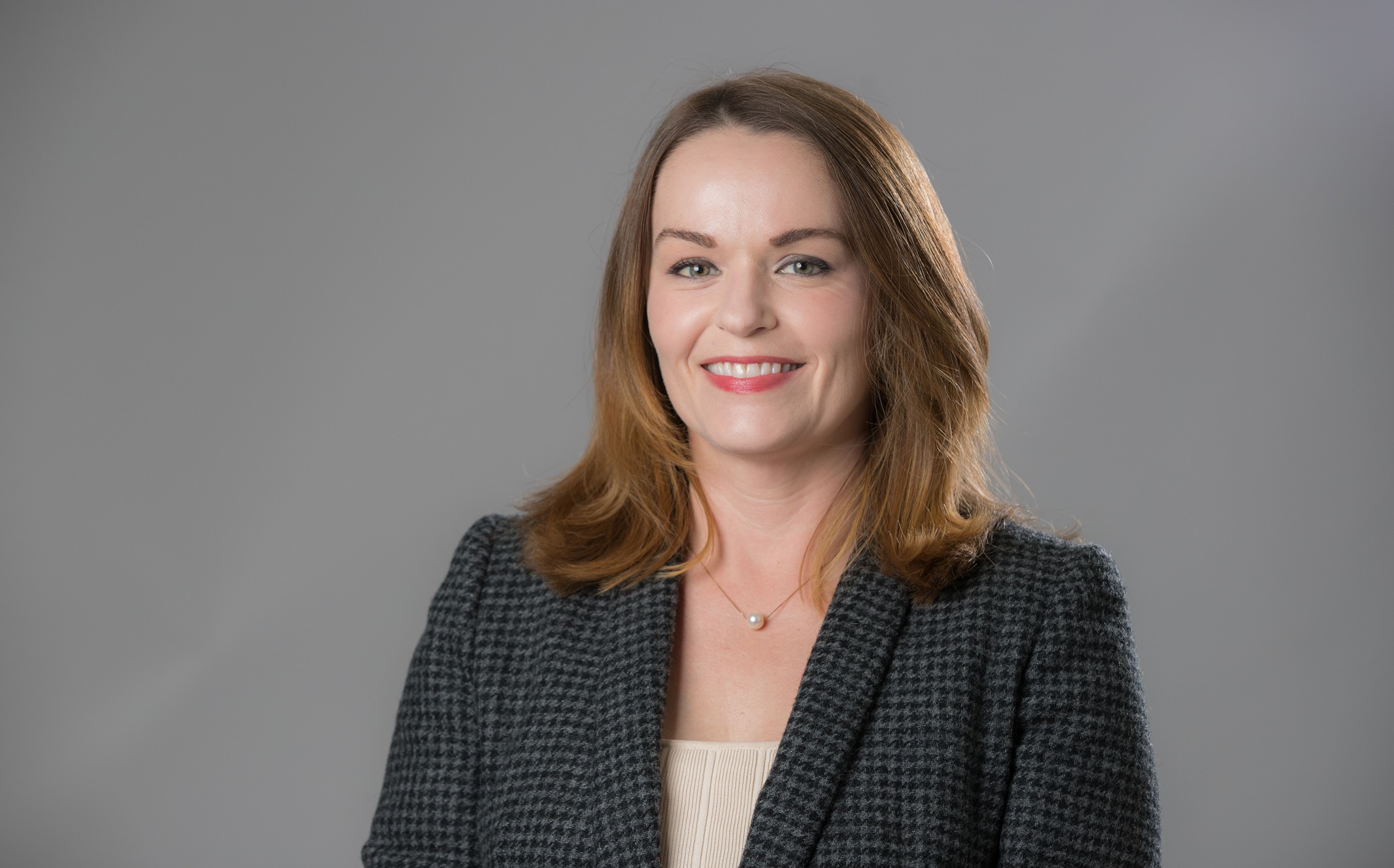
Meet the new UMKC Foundation president
Alumna Amanda Davis, (MPA ’02) begins her role as UMKC chief advancement officer and president of the UMKC Foundation this week. Her vision for the role is based on her history at the university.
Davis is a five-generation Missourian and an alumna of the UMKC Bloch School of Management where she earned her master’s in public administration. She was a fundraiser for the Red Cross in New Orleans and other nonprofits before falling in love with higher education and returning to Kansas City to work at the UMKC School of Law. Her most recent role was assistant vice president for campaign leadership at the University of Oklahoma Foundation, where she developed programs and policy to accelerate advancement outcomes. Her focus on identifying gift opportunities and prospects contributed to more than $300 million in annual fundraising results and the launch of a $2 billion comprehensive campaign for OU.
What are you most looking forward to in your new position as UMKC Foundation president?
I’m looking forward to having the opportunity to put the education that I received at the Bloch School of Management to good use to help the university grow and continue to succeed. Part of that is to improve the university’s advancement in an overarching sense, and also grow partnerships with existing donors and alumni.
As an alumna, how does it feel to be back on campus?
Honestly, it’s thrilling. There is so much going on at both campuses. It’s very exciting to come home to UMKC at this particular moment. The chancellor’s leadership is visionary, which dovetails with the visionary leadership we are seeing across Kansas City and complements the incredible strength of the UMKC Foundation board. It’s an exciting time for me to step back in and to be able to make positive change and continue to build UMKC.
How does your experience as a student impact your perspective as UMKC leadership?
I have an incredible enthusiasm for this institution, particularly in its current iteration. I came to UMKC at the exact time in my life that allowed me to discover philanthropy as a career. It's incredibly meaningful to be able to take a skill set that I learned from UMKC, and then come back and use those skills to benefit the institution. I hope my work at UMKC enables other students to feel at home here and have the opportunity to earn an education in their given field so they can go on to do great things.
When you think about the best teams that you’ve been a part of, what about them stands out in your mind?
Two things stand out to me. One, on the best teams there is a safe psychological space to take risks and to do the best you can do. And two, it’s important to have a cohesive direction from leadership so everyone knows what their role is and that they are all rowing in the same direction.
What do you think is the key – or keys – to successful fundraising?
Considering everything from the donors’ perspectives is essential. It’s important to recognize that many of our most engaged donors may be giving in different ways. Perhaps they give an annual gift, but have also planned an estate gift, or are passionate about supporting a specific program or student service. It’s essential to consider how their interests in giving intersect to understand how they feel about the university and how it feels to be the donor from outside the organization.
One more – what is something about you that would surprise people?
One of my passions is costume making. I inherited that gene from my mother, who always made us fabulous Halloween costumes. That’s where I learned the transformative power and fun of costumes. When I moved to New Orleans in my twenties, I was the person my friends came to for help with their Mardi Gras costumes.
Nov 30, 2022
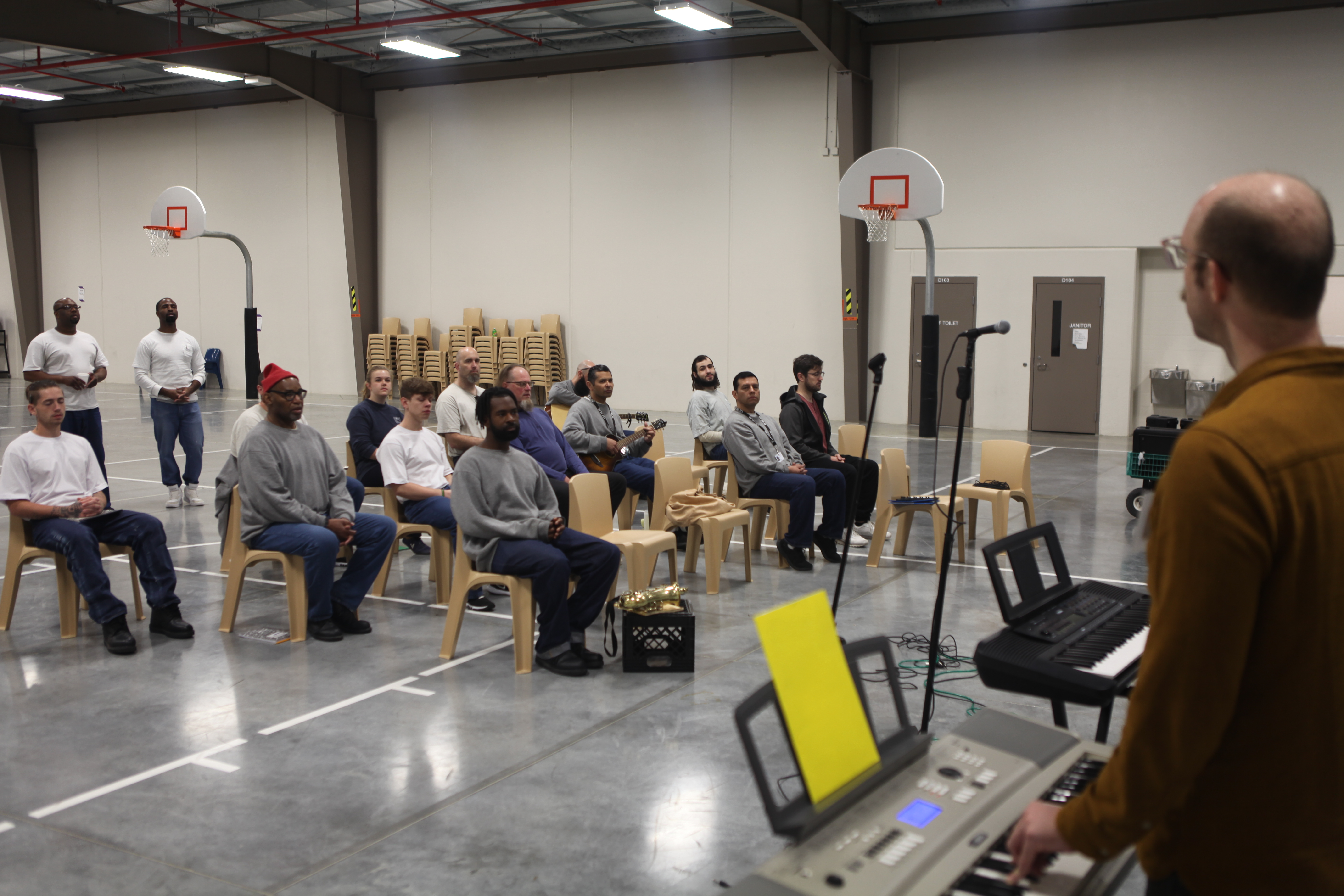
UMKC faculty bring music program to prison, inspiring hope
Faculty members Yotam Haber and Owen Belcher routinely step into a world apart from academic music, yet one that vividly demonstrates the universality of the art.
The pair formed a UMKC chapter of Musicambia, a New York-based nonprofit that works with incarcerated prisoners on composing and performing music. Twice a month, they cross the threshold of the Lansing Correctional Facility in Lansing, Kansas —about a 40-minute drive from campus —to make music with the men incarcerated there.
“Musicambia has been on my radar since about 2017. I’ve been wanting to work with them since my previous position (at the University of New Orleans),” Haber said. When he came to UMKC in Fall 2019, he met Belcher, another new member of the faculty who had a similar interest. Haber suggested they connect with Musicambia to launch the local program.
“It was thanks to my collaboration with Owen and a generous gift from the Kauffman Foundation that allowed us to bring Musicambia here and help us launch our program at Lansing,” Haber said.
Musicambia began as a branch of Carnegie Hall’s Musical Connections Program at Sing Sing Correctional Facility in 2013, and then incorporated as a separate non-profit in 2014.
The national Musicambia organization contacted the wardens at several prisons in the Kansas City region. “Lansing was both the closest and the most willing to work with us,” Belcher recalled.
Following the established Musicambia roadmap, the relationship began with the organization’s Founder/ Artistic Director Nathan Schram and Program.
Director Elliot Cole leading an intensive five-day songwriting session at Lansing along with Haber, Belcher and three of their students. Since then, Haber, Belcher and the students have been returning to Lansing twice a month to continue the music program.
“I was pretty nervous that first day,” Belcher recalled. “But due to the intense nature of the five-day schedule, you get over the nerves and initial shyness pretty quickly. I'd say it took about an hour or two to begin developing a sense of mutual trust. It's a lot to ask of a group of men to sing in front of each other and in front of strangers. It's a vulnerable thing to do, and the prison environment is not one that traditionally rewards vulnerability.”
The program involves creating music, as well as performing it.
"In our work at Lansing, we guide our participants in the process of creating, from the germination of a tiny musical kernal to a full concert. We are not playing music to the students; rather, we facilitate their own vision," Haber said. "It's deeply fulfilling to see this come into fruition. It's the reason I'm an educator, not just a composer."
As for the impact, "I don't want to speak for the participants, but I would hope that our program offers them an outlet to express themselves musically, a chance to work out their artistic ideas and develop their musical abilities," Belcher said. "Our program is designed to be collaborative. What this means in practice is that, although UMKC faculty and students often lead activities, we try to be more like musical partners rather than operating under a traditional teacher-student scenario. If we wind up giving advice or helping answer questions, that arises organically."
Belcher said his motivation stems naturally from his scholarship in music theory.
"My discipline stresses the need to become more inclusive and involve the community; this is also an important goal for the university," he explained. "Incarcerated people are not just underserved —in many cases they aren't served at all."
Haber also pursues a deeper purpose.
"Being in prison is, in large part, not a rehabilitative or positive experience. Most of the incarcerated population will eventually be released, and from my experiences and conversations, they want to build better lives for themselves and their families," Haber said. "Making music together can be a deeply fulfilling, shared, positive experience. I hope that in some small way, this project helps their wellbeing, their sense of purpose and brings some joy."
Nov 29, 2022
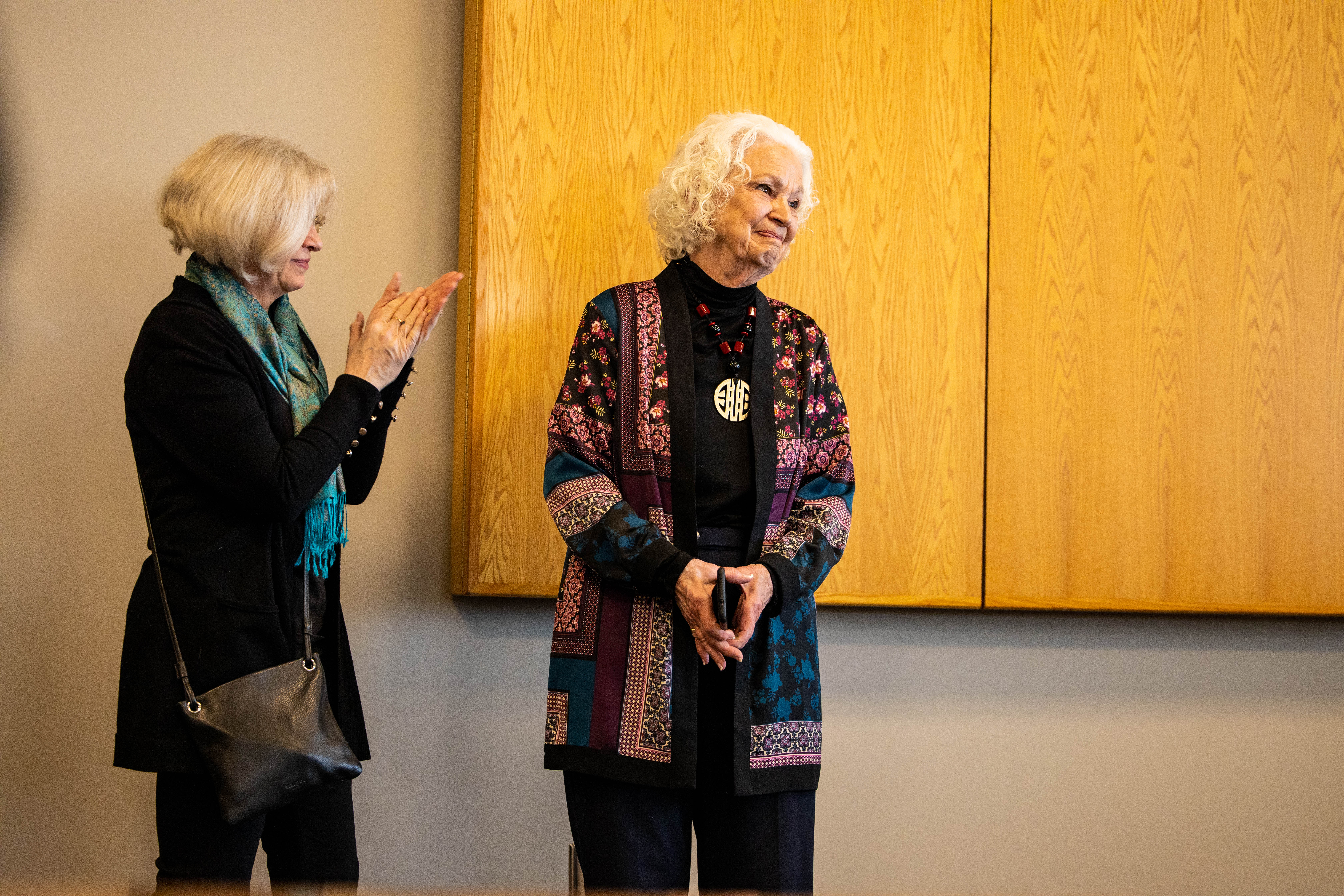
Annette Luyben continues her family’s history of supporting musicians
Anette Luyben, who grew up working in her family’s eponymous music store on Main Street in Kansas City, has lived her life surrounded by music and musicians. While the shop has moved online and narrowed its services, she continues to fuel the music community in Kansas City through gifts to the UMKC Conservatory.
In the past two years she has established four endowed scholarships for Conservatory students and contributed materials to the LaBudde Special Collections.
“My father opened the business in 1948,” Luyben said of the music shop.
"There should be a sign above the door that says, ‘The nicest people in the world walk through these doors.'”—Annette Luyben
While the first location of the store was farther south on 63rd Street, most people are familiar with the trim brick building on Main Street with the red door and red and white striped awning, with “Luyben” in distinct, linear black lettering.
“I was there from the time I was 5 years old. Later, when I went to Westport High School, I would walk over to the store to work after school. During college I worked there during the summers.”
Luyben’s sold sheet music, musical instruments and supplies, and also provided lessons for students. She remembers her parents hiring their first Conservatory student to work in the shop in 1955.
“They hired Don Shoberg, a student who had come in to buy a reed,” she says. “My mom liked him and asked if he wanted a job. He worked for us for 63 years.”
Shoberg (B.M. ’58; M.M. ’64, music composition) was the first of more than 200 students of the UMKC Conservatory who would come to work with the Luybens.
“It has been a strong bond,” she says.
Despite her respect for the business and the delight of the many friendships she made there, she did not start out to make music her life’s work.
“I have a degree in American history and economics, and I taught high school for 15 years,” said Luyben.
Luyben quit teaching and went to work in the shop when her father was diagnosed with Parkinson’s disease.
“I knew if the business was going to continue that my mother was going to need more help,” she says. “It was totally my choice. I was proud to be Bob Luyben’s daughter.”
The Luybens’ connection with the Conservatory included relationships with customers who had first come to the shop as children. American operatic tenor Vinson Cole, (B.M. ’72) would visit the shop as a child, Luyben recalls. As a high schooler, Grammy award-winning opera singer Joyce Di Donato was another regular visitor at the Luybens’ shop.
“We were blessed to have so many wonderful customers. I used to say, There should be a sign above the door that says, ‘The nicest people in the world walk through these doors.'”
That good will did not stop with the relationships that the Luyben family had with the students through employment and commerce. Annette Luyben is an enthusiastic and dedicated supporter of UMKC students and programs. She donated significant documentation from the shop archives to the UMKC LaBudde Special Collections this year. But her focus —and joy — is in supporting scholarships for students.
“When my mother passed away, we asked that people support a scholarship at the Conservatory in her name in lieu of flowers.”
When Robert Luyben died in 1993, she added his name to the scholarship and shifted the requirement to support students studying clarinet. But her generosity did not end there. She has established three named scholarships in the last two years.
Shoberg, who worked at the shop for those many years, died in May 2021. He remembered Annette Luyben in his estate, and her first thought was to use the money to honor Shoberg with an endowed scholarship in his name.
"I'm the messenger . . . I'm happy there’s scholarships in place that other people can give to."— Annette Luyben
“Don was very active at UMKC. He was on the UMKC Alumni Association Governing Board and was very active with the Conservatory Alumni and Friends Governing Board. A scholarship seemed like the best way to honor him.”
When Luyben’s close friend Richard Williams died six months later, she thought contributing to the scholarship in his name would be a fitting tribute to Williams’ dedication to the Conservatory for his work as assistant professor of piano and voice.
“When I called Mark Mattison and told him that I wanted to contribute to Richard’s scholarship, he let me know that there wasn’t a scholarship in Richard’s name,” said Luyben.
With some of the money remaining from Shoberg’s estate, Luyben committed to establishing the Richard L. Williams Memorial Scholarship, which is available to students studying percussion.
“Richard was in our store all the time. He’d been with the Conservatory for 40 years and was close friends with Don. The day I talked to Mark I went out to get the mail and there was another check from the settlement of Don’s estate. It was enough to endow the scholarship.”
Rather than seeing herself as the significant philanthropist she is, Luyben credits her late friends.
“I’m the messenger,” she says. “It’s Don and Richard up there doing this. I'm happy there’s scholarships in place that other people can give to.”
Her most recent gift is an endowment for the Karen Richie Greer Memorial Scholarship in Percussion in honor of Karen Ricci Greer, (B.M.E., ’63). Greer, a Kansas City native and gifted percussionist, was a part-time member of the Kansas City Philharmonic at the age of 15. By the time she was 20 years old, she had joined the philharmonic full time.
Greer and Luyben became close friends in their adulthoods and attended many Conservatory events together. After Greer’s death Luyben attended a performance by percussionist Isaiah Petrie.
“He blew my mind,” she remembers. “The following week I reached out to Walter Greer and said, ‘I saw this musician play and he’s remarkable. It made me think of Karen. Do you want to establish a scholarship with me in her name?' And he did.”
Luyben waves away the idea that she could be spending this money on herself.
“These people deserve to be remembered,” she says. “It’s important. Don was incredible. Richard Williams and Karen committed so much. They deserve to be remembered in some other way than on a tombstone.”
Nov 29, 2022
Generosity from donors enables the UMKC Conservatory to expand their Keyboard Area
The UMKC Conservatory has purchased two new Steinway & Sons pianos for performances by students, faculty and guest artists.
In September 2021, then-Interim Dean Dr. Andrew Granade traveled with keyboard faculty Alon Goldstein, Thomas Rosenkranz, and Karen Savage to the Steinway & Sons factory in Astoria, Queens to preview, test and select the pianos. The Conservatory also worked with Gordon McNelly, president and owner of the Steinway Piano Gallery in Lenexa, Kansas.
After careful consideration, the group selected a Hamburg Steinway D, purchased with funds from a generous grant by the Richard J. Stern Foundation for the Arts, and a Steinway model B, purchased with a gift from Mr. Michael Waterford.
Rosenkranz, associate professor of piano and coordinator of the Keyboard Area stated, “The keyboard area at UMKC is extremely grateful to the generosity of the donors that supported the purchase of two new Steinway grand pianos. Steinway pianos have a coloristic range and projection that is in a class all their own, and we believe that these new instruments will inspire and benefit our faculty and students for generations to come.”
Granade was also grateful to bring the prized new pianos home, noting, “The Conservatory is thankful for the many donors who also made contributions toward the purchase of these pianos, as their generosity made the selection possible. The Hamburg Steinway will be on White Recital Hall stage for performances by students, faculty and guest artists and is truly a world-class piano.”
Nov 29, 2022
Tensions have been rising between the two nations for generations over human rights abuses, nuclear facilities and women’s rights.
Despite the fact that his squad has played one of the World Cup’s top teams to a draw right before having to win or go home Tuesday, USA Head Coach Gregg Berhalter was fending off questions about the deeper political meaning of his team’s match against Iran. No matter how much he and his players want to frame it that way, UMKC associate political science professor Dr. Debra Leiter said it’s just not possible. “The United States has identified Iran as one of its rivals and Iran has certainly targeted the United States as its key geopolitical rival,” said Dr. Leiter. Read more.
Nov 29, 2022
The Jackson County Legislature approved another $5 million grant Monday for a group that's made an impact in improving the health of East Kansas Ci...
Dr. Jannette Berkley-Patton, UMKC School of Medicine professor and director of the UMKC Health Equity Project, is in charge of the effort. Read more.
Nov 22, 2022
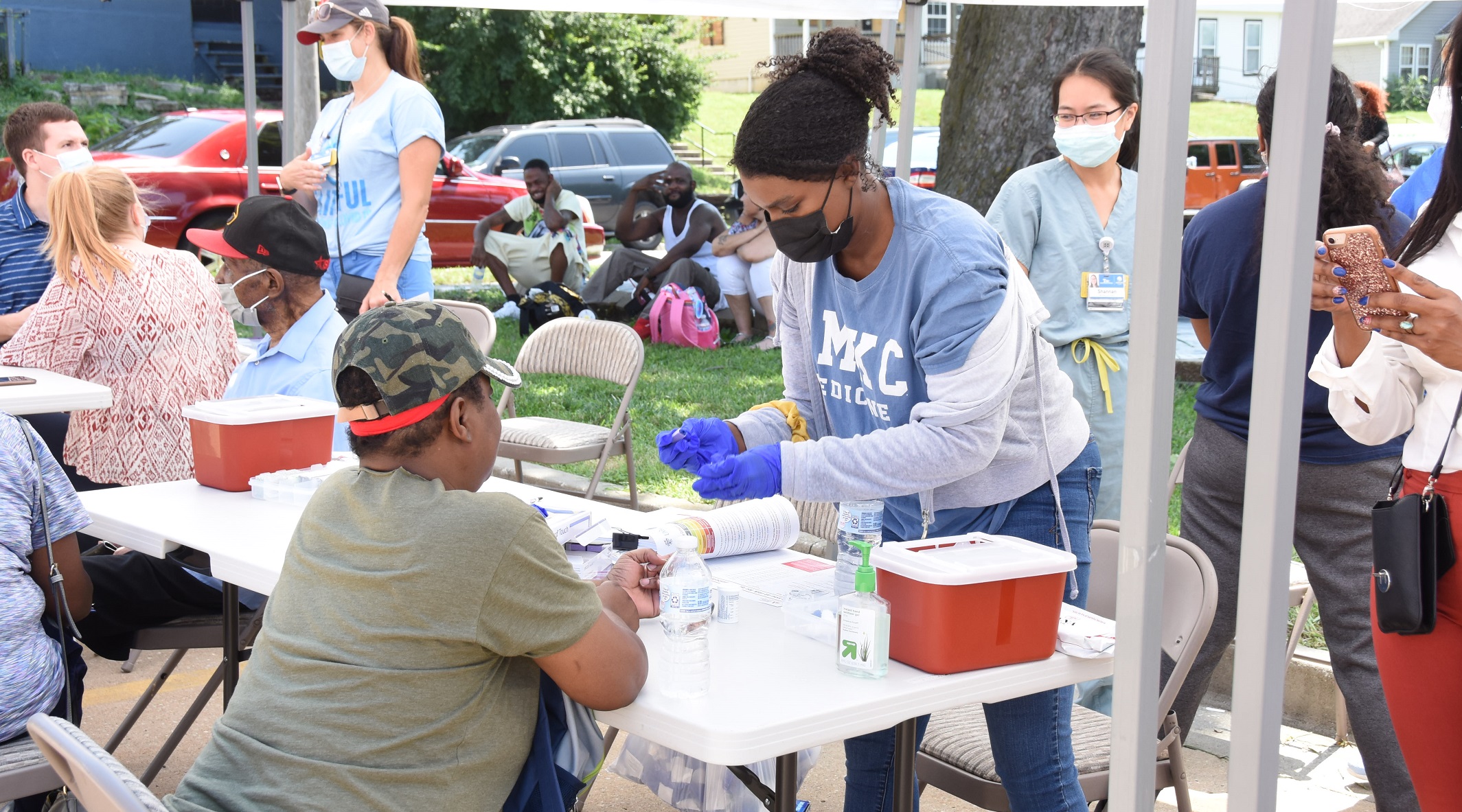
Funding from Jackson County will expand health services on Kansas City’s Eastside
The Jackson County Legislature approved $5 million to continue community health initiatives through Our Healthy Eastside Kansas City, based on the success of the coalition’s impact on COVID-19 and community health from its original funding in 2021.
Jannette Berkley-Patton, Ph.D., professor in the UMKC School of Medicine and director of the university’s Health Equity Institute, is leading the project. The funding will expand COVID-19 vaccinations, health screenings, reproductive services to address infant mortality and successful diabetes prevention programs in Kansas City’s Eastside. This funding is a continuation of the program’s initial $5 million grant.
Our Healthy KC Eastside is a community-wide initiative that promotes and delivers widespread COVID-19 vaccinations and other health services to residents on the east side of Kansas City. More than 60 community organizations and health agencies are partnering with OHKCE to support healthy lifestyles through vaccine events and health screenings such as blood pressure checks, diabetes screenings and dental education. OHKCE health agency partners include the UMKC schools of Dentistry, Medicine, Pharmacy and Nursing and Health Sciences, Children’s Mercy Hospital and University Health.
As part of the OHKCE initiative, more than 3,000 Kansas City residents completed surveys on their health beliefs, which showed that indifference or fear was not always behind low vaccination rates. Often, transportation or access to healthcare were factors. Providing healthcare delivery in community hubs on weekends and evenings provided better availability.
“This is a significant advance in assuring accessible and preventative health services are available to Jackson County residents,” Berkley-Patton says. “Our success with Our Healthy Eastside Kansas City is evidence that working collaboratively with community and health partners can greatly increase the reach of health care in the most underserved neighborhoods and have a positive impact on our entire community.”
“As a provider of community health and regional health education, UMKC recognizes the significance of this funding on our community,” UMKC Chancellor Mauli Agrawal says. “We thank the Jackson County Legislature for their leadership on this issue, and congratulate Dr. Berkley Patton on her dedication to high quality healthcare delivery to every citizen of Jackson County.”
Nov 21, 2022
Achievements noted by legal organizations representing diverse communities
Students and alumni from the School of Law at the University of Missouri-Kansas City were recently recognized with awards and scholarships by two local legal organizations with diverse memberships.
The Jackson County Bar Association, which primarily represents Black attorneys, has recognized State Sen. Barbara Anne Washington (J.D., ‘97), a UMKC School of Law alumna, with the 2022 Lewis W. Clymer Award. Clymer was an assistant prosecuting attorney, assistant attorney general for Missouri, municipal court judge and circuit court judge. The award recognizes a minority attorney for their service to the community and their promotion of the integrity of the legal profession.
The organization also awarded Kit Carson Roque, Jr. scholarships to third-year UMKC law students Sommari T. Muwwakkil II and Jamie Powell. The Roque scholarship is named in honor of UMKC School of Law alumnus the late Kit Carson Roque, Jr. (J.D., ‘76), who served as both a Jackson County Circuit Court judge and a civil rights attorney for the U.S. Dept. of Education.
The Hispanic Bar Association of Greater Kansas City awarded three scholarships to UMKC law students: Alejandro Villalobos, Julia Hernandez and Myriam Paniagua. The scholarships were awarded at the organization’s 30th anniversary scholarship reception, which featured a keynote address by UMKC alumna Judge Justine E. Del Muro (B.A. ’78, J.D. ’84), a Jackson County Circuit Court judge.
“Our School of Law is committed to providing opportunity for all to pursue an exceptional legal education,” said Dean Barbara Glesner Fines. “These awards demonstrate the strength of that commitment.”
Nov 17, 2022
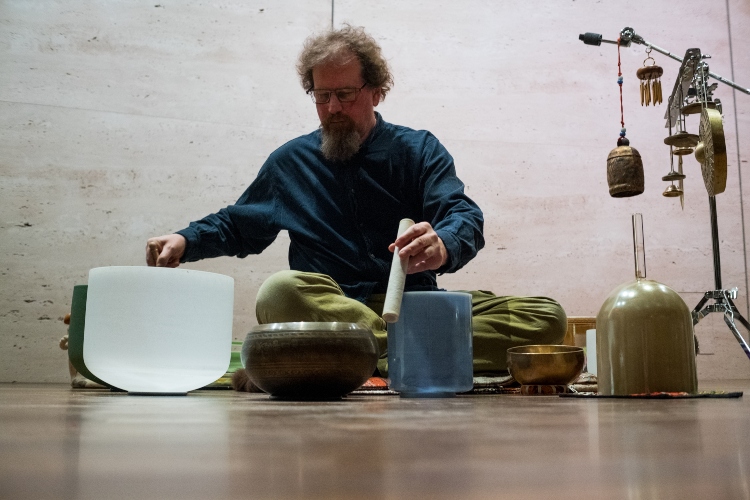
The fine-tuned eccentricities of Paul Rudy.
Paul Rudy has always been fascinated with sound. He’s ridden the sound waves to many impressive achievements as a composer, performer, Guggenheim Fellow, Fulbright Fellow, artist and sound healer. He’s currently the Curator’s Distinguished Professor, but his path to UMKC and the honorary title “High Priest of Sound” was as winding as the labyrinth he created on his Kansas farm.“I understood the power of sound when I was a kid,” Rudy recalled. “My sister was watching a horror movie, and I was behind the couch playing. I heard this sound, and I stood up and started watching. It totally sucked me in. That movie scared the crap out of me! But I knew it was that sounds that drew me in.”Rudy’s fascination with sound continued into his college career, even when he thought it wouldn’t.“I did a jazz trumpet degree at Bethel College in Newton, then I quit music altogether and became a mountain climber and carpenter for four or five years,” he said. “That wasn’t stimulating my brain enough, though. I’ve been chasing my tail my whole life.”The chase would bring him back to music in the late 80’s, when he joined a composition class at Wichita State University. It was there that he composed a piece of music his instructor described as graduate work. Invigorated by this taste of success, he applied for a music composition program at the University of Colorado and earned an assistantship in the program.
"Over the last ten years, I've started to love teaching. It went from being part of the job to something I really look forward to doing." — Paul Rudy
“I discovered the studio, and I fell in love with actually making and sculpting sound,” Rudy reminisced.“That’s why I went the electronic route.”It was this interest in electroacoustic music that would provide him with another opportunity in his academic career. This time, at UMKC’s Health Sciences Campus, working in tandem with Dr. Gary Sutkin, professor of surgery and associate dean of women’s health. Together, the two are studying how sounds in the operating room can affect health outcomes for patients during surgery.“Paul is a scientist,” said Sutkin of his colleague. “When I think of people in the Conservatory, I think of creators, musicians and artists, but I never think of science. And yet, Paul’s brain thinks like a scientist. He comes up with scientific principles, questions for us to analyze, and then he’s really good at analyzing data and distilling it down to what we need to answer our questions.”“I think my study with electroacoustics and knowing how the brain processes sound brought me to the operating room study,” Rudy says. “Sound is vibrating on us, acting upon us all the time. Every time we hear sound it’s not just hitting our ears; it’s hitting our whole body. There was a part of me that was excited about offering something other than just the study of music. This seemed to be an opportunity to take that work into a deeper, more significant arena, and it’s still unfolding.”“We’ve been studying it for about two or three years, and we’re going to study it for about another 20,” said Sutkin, only half-jokingly. “We’re not the first ones to measure the sound environment, but I think we are the first ones to really delve into what we call ‘speech communication interference,’ when someone says something, and the other person doesn’t hear them. There are so many machines that are making loud noises, multiple conversations going on. We’re measuring those interferences, then I think we can make recommendations.”Those recommendations could one day save lives by changing the very nature of how operating rooms are built and managed. For now, the pair are happy with the success they’ve seen, having been published in one medical journal, with a second article currently under review.Rudy considers research a part of his creative process, satisfying his analytical side so as not to hinder creative flow while making his art. “The brain is really good at cataloging and organizing things, but the spirit knows how to make the best use of it all.” That was the realization, Rudy says, when creating became fun. “I felt like I had all these resources starting to really work together and complement each other.”Rudy’s creative spirit carries well beyond music. Settled on 70 acres, north of Lawrence, Kansas, you’ll find Harmony Farm, a home as interesting and eccentric as the man who lives there.“It’s become a canvas, of sorts, that I photograph and that I use to make modern day ‘Nazca Lines,’” says Rudy, referring to massive and mysterious geoglyphs etched across Peru’s Nazca Desert. While Rudy openly admits to keeping a quiet social life outside of the farm, he’s ever eager to share his passions with students at UMKC.“Over the last ten years, I've started to love teaching,” Rudy says. “It went from being part of the job to something I really look forward to doing. Part of what I love is staying in touch with young people.”“Paul is one of the most generous people I know, and one of the most open thinkers,” said Andrew Granade, former interim dean of the Conservatory. “I’ve been on dissertation graduate committees with him many, many times with his students, and they all sound like themselves. He has a unique ability to listen to them, respond to them and help them grow into the artist they need to be.”Rudy challenges his students to find fresh perspectives, and he does so with zest, teaching a general education course he calls the artist in society. “I’ve had students tell me they’ve never seen a piece of art before, I’ve had students tell me they’ve never had a conversation with someone they disagreed with before,” Rudy says. “And I just love seeing what happens when they have those new experiences. Part of my job is mentoring them into those new experiences. I present them with some really uncomfortable stuff, sometimes purposefully, for them to learn how to witness what happens in them when things get uncomfortable.”"Paul is very Socratic in his teaching style,” said Granade, “I imagine the first couple of weeks it’s a little bit uncomfortable for them, because any time you have your beliefs or thoughts challenged, it’s uncomfortable. But what he’s doing is basically saying this is the role of the artist, literally the role of the artist in society is to open up these dialogues.”Rudy says he wants students to think about the ways they act and react. How do they navigate obstacles? How do they learn and grow?
It's a practice he recently had to exercise himself. But through a painful experience, he says he’s found one of his proudest moments.Rudy’s long-time friend, poet Jay Hopler was 51 years old when he lost his battle with cancer in June. The two had studied together at the American Academy of Rome in Italy.“In 2017, Jay was thinking about a poem that would describe himself, and he asked me, ‘If I were a piece of music, what would I be?’” Rudy says the melody was instant. “I heard the music in my head. That doesn’t happen often. Most of the time, it’s hard work, but I knew exactly what Jay sounds like.”Holding up a copy of still life, Hopler’s final published book of poetry, Rudy turned to the last page of the closing entry, where just a few bars of music were included with the poet’s words.“It’s the second-to-last line, even,” he notes. “I don’t think anybody’s ever done that before. A little piece of music, describing this poet, is part of his obituary poem. I didn’t know that until I saw the final copy of the book. I’m actually considering making a whole piece in memoriam of him to celebrate his amazing words and amazing life.”It's there Rudy shows his spirit again. His spirit for life, healing and creation through sound, even when faced with the loss of a friend. It’s this unique mindset that has pushed him to find success time and time again, both personally and professionally.“For me,” Rudy says, “the bottom line is, 'Is what I’m doing interesting?' If not, is it the thing I’m doing? Or the way I’m doing it?” Adding, “It’s usually the latter.”It’s this ability to reshape his own perspective that’s given Rudy new love for everything he does.“I think that’s when my academic career started to change. When I realized it’s not the responsibility of my job to give me fulfillment, that’s my responsibility to find fulfillment in what I’m doing. I love these interesting collaborations that I’m constantly on the lookout for. Teaching is one of those collaborations between me and the generation that’s going to rule the world someday. How cool is that?”
Nov 17, 2022

UMKC alumnus Bob Carpenter has done it all, from World Series to World Cup
UMKC alumnus and voice of the Washington Nationals Bob Carpenter (’75) will speak at the mid-year commencement celebration for the Class of 2022 at the T-Mobile Center.
The mid-year commencement will take place at 2 p.m. Sunday, Dec. 18 at Kansas City’s downtown arena. There will be a single ceremony for all academic units. More than 1,000 graduates are expected to participate.
Carpenter earned his bachelor’s degree in Radio-TV-Film from UMKC in 1975 and has fashioned a successful 47-year career in broadcasting. He will be announcing his 40th season of major league baseball in 2023, his 18th for the Nationals. Carpenter has also announced baseball for the St. Louis Cardinals, Texas Rangers, New York Mets and Minnesota Twins.
In 18 years with ESPN, he was a mainstay of their baseball, college basketball and football coverage. He announced seven NCAA basketball tournaments and the Final Four in 2005 for NCAA International. He hosted College Gameday and was one of ESPN’s primary soccer commentators for the 1982 and 1994 World Cups.
Bob and his wife of 43 years, Debbie, have raised more than a half-million dollars for charity in their hometown of Tulsa, Oklahoma. Bob says his two best life decisions have been 1) marrying Debbie and 2) coming to UMKC sight-unseen in January of 1974.
Nov 16, 2022
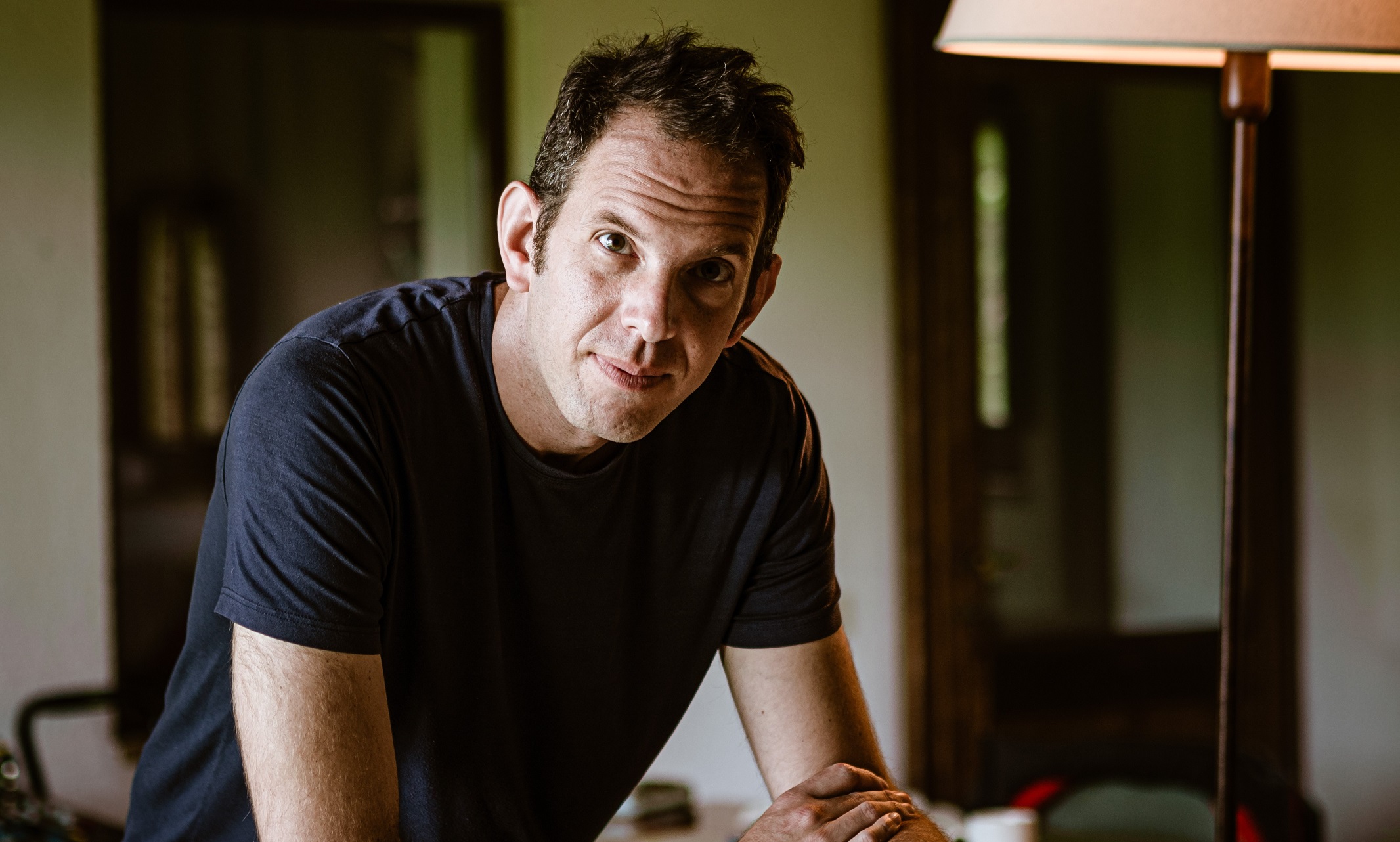
Yotam Haber wins $15,000 to write a major new work
Yotam Haber, associate professor of music composition, was awarded a $15,000 commission to write a new work for the Kahl and Nyce Duo.
Haber’s commission is through Chamber Music America’s (CMA) Classical Commissioning program, which supports U.S.-based composers and ensembles who perform classical and contemporary music. The grants provided through the program support the creation and performance of new works by American composers.
“The CMA’s Classical Commissioning program is prestigious and extremely competitive,” said Haber. “Receiving a grant from CMA is deeply coveted and I’m incredibly honored to have gotten one to write for the Kahl & Nyce Duo, two magnificent artists.”
Haber’s commission will support his work composing a large-scale piece of music for saxophone, piano and electronics. This work will expand on ideas he first explored in “Resistance,” a trumpet piece he wrote for Don-Paul Kahl of the Kahl & Nyce Duo.
“This recognition demonstrates how highly regarded Yotam is as a composer and our students benefit greatly from his knowledge as a professor,” said Conservatory dean Courtney Crappell. “We’re excited to see what he creates with this significant new commission.”
Haber has earned several prestigious awards in the past, including the 2021 Benjamin Danks Award from the American Academy of Arts and Letters, a 2017 Koussevitzky Commission from the Library of Congress, a 2013 Fromm Music Foundation Commission, a 2013 NYFA award, the 2008 Rome Prize and a 2005 John Simon Guggenheim Memorial Foundation Fellowship.
Nov 15, 2022
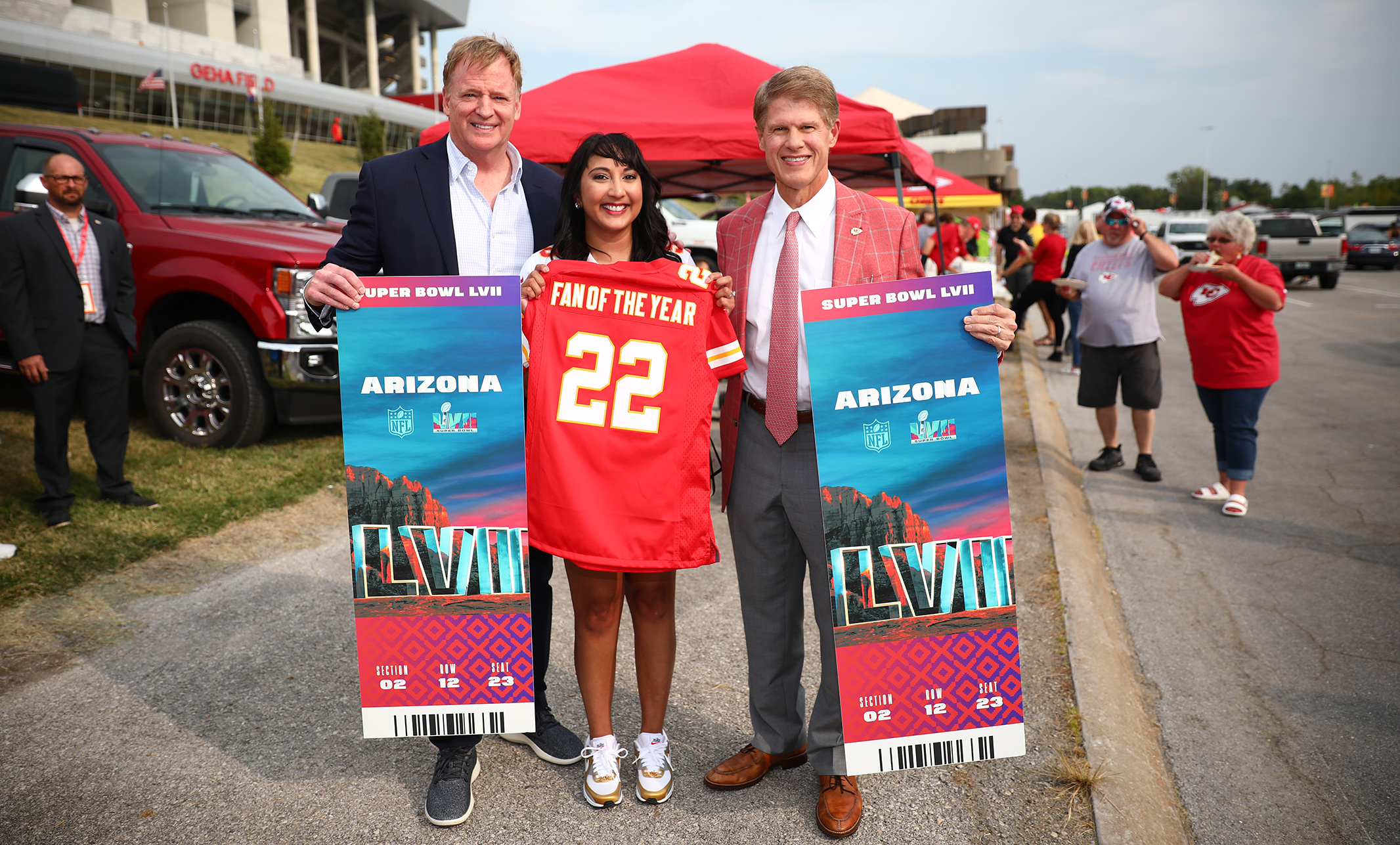
Amy Patel is headed to the Super Bowl as Chiefs’ nominee for NFL Fan of the Year
The Kansas City Chiefs are on a roll in the National Football League and UMKC School of Medicine alumna and faculty member Amy Patel, M.D., is now part of the excitement surrounding Chiefs Kingdom.
Patel, a 2011 graduate and assistant professor of radiology at the School of Medicine, is celebrating the team’s success as its 2022 Fan of the Year. With that, Patel is now the Chiefs’ nominee for 2022 NFL Fan of the Year.
Patel learned of the honor earlier this year before the Chiefs’ home-opening game against the Los Angeles Chargers when she was awarded the game’s Lamar Hunt Legacy Seat that recognizes a community member who represents the spirit of Lamar Hunt, the team’s founder.
“I got to meet (Chiefs’ owner) Clark Hunt and NFL Commissioner Roger Goodell who shared the news with me,” Patel said at the time. “I am still in shock! But I feel so honored to have my work recognized as well as my love of the Chiefs.”
As Chiefs Fan of the Year, Patel will receive two tickets to the Super Bowl in Glendale, Arizona, on Feb. 12 and will be invited to take in all of the game’s surrounding activities.
Each of the NFL’s 32 teams selects a Fan of the Year. Through a combination of fan voting on the league’s web site that began this week and scoring by a panel of judges based on the individual’s enthusiasm, team fandom, inspirational story and community spirit, the NFL will select and announce its Fan of the Year at the Super Bowl.
Patel is a breast imaging specialist and medical director of the Breast Care Center at Liberty Hospital. With a primary focus on breast radiology and research in breast health equity, artificial intelligence, and digital breast tomosynthesis, she helped to build a comprehensive breast care program in Liberty.
Her love for the Chiefs began at an early age growing up in Chillicothe, Missouri. After earning her medical degree, she went to Harvard University, where she helped build a comprehensive breast care program at a local hospital. In 2018, Patel returned to Kansas City, where she is recognized as a champion of helping women achieve equitable access to breast care and a loyal fan of the Chiefs.
Nov 11, 2022
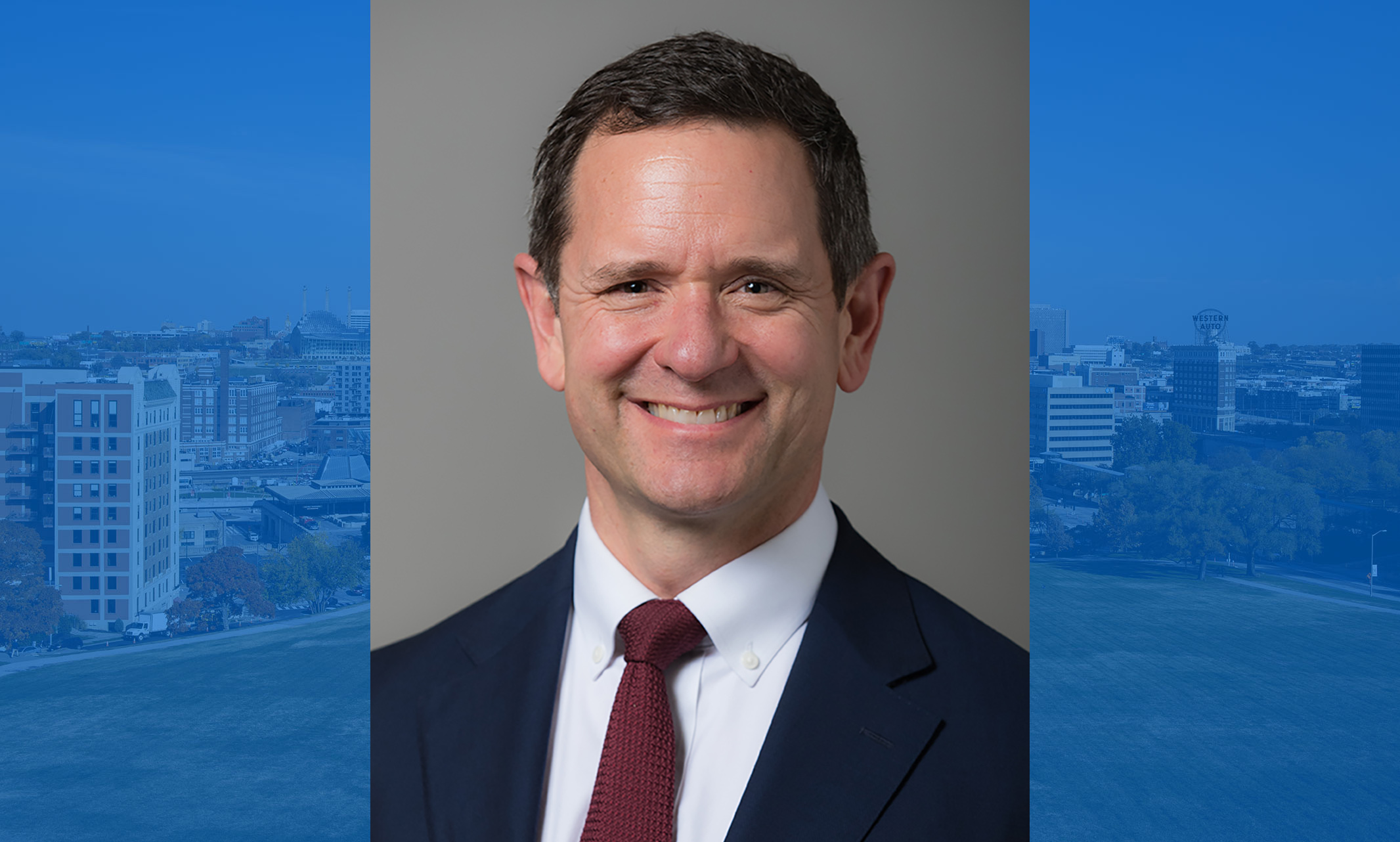
Gus Sonnenberg is a 1997 graduate of the UMKC School of Law
Gus Sonnenberg, a 15-year fundraising veteran, has joined the UMKC Foundation as senior director of major gifts for the Health Sciences Campus. He will work specifically with the schools of Nursing and Health Studies, Medicine and Pharmacy.
Sonnenberg will work with the schools’ leadership to identify, cultivate, solicit and steward those who want to make an impact on student’s lives. He said he is making plans to meet with leadership, faculty and donors to understand the schools’ priorities and create a plan to move forward.
He brings with him a strong record of success managing capital campaigns, having secured six- and seven-figure gifts. He has also led continuing education conferences and taught courses on educational foundation fundraising and leadership.
Sonnenberg, a 1997 graduate of the UMKC School of Law, said he understands the role UMKC plays in serving the greater Kansas City area, and is excited about the work that can be done to advance programs and provide financial support for students.
Sonnenberg is a Kansas City native who attended Rockhurst High School and Creighton University on an Army ROTC scholarship before law school. He started his legal career as an assistant prosecuting attorney in Cass and Jackson counties, working on everything from traffic tickets to felony trials. He was recruited to become general counsel for the General American Mutual Holding Company Receivership, where he managed the distribution of $1.2 billion dollars to individuals and companies around the world.
After wrapping up the receivership, Sonnenberg changed careers and became director of development for Rockhurst High School.
He has been active in the Kansas City Bar Association, St. Elizabeth Parish, Cub Scouts, Brookside Soccer, and the Jesuit Schools Network. He and his wife Julie, a physical therapist and founder of Empower Physical Therapy in Prairie Village, have four children and live in Leawood, Kansas.
Nov 10, 2022
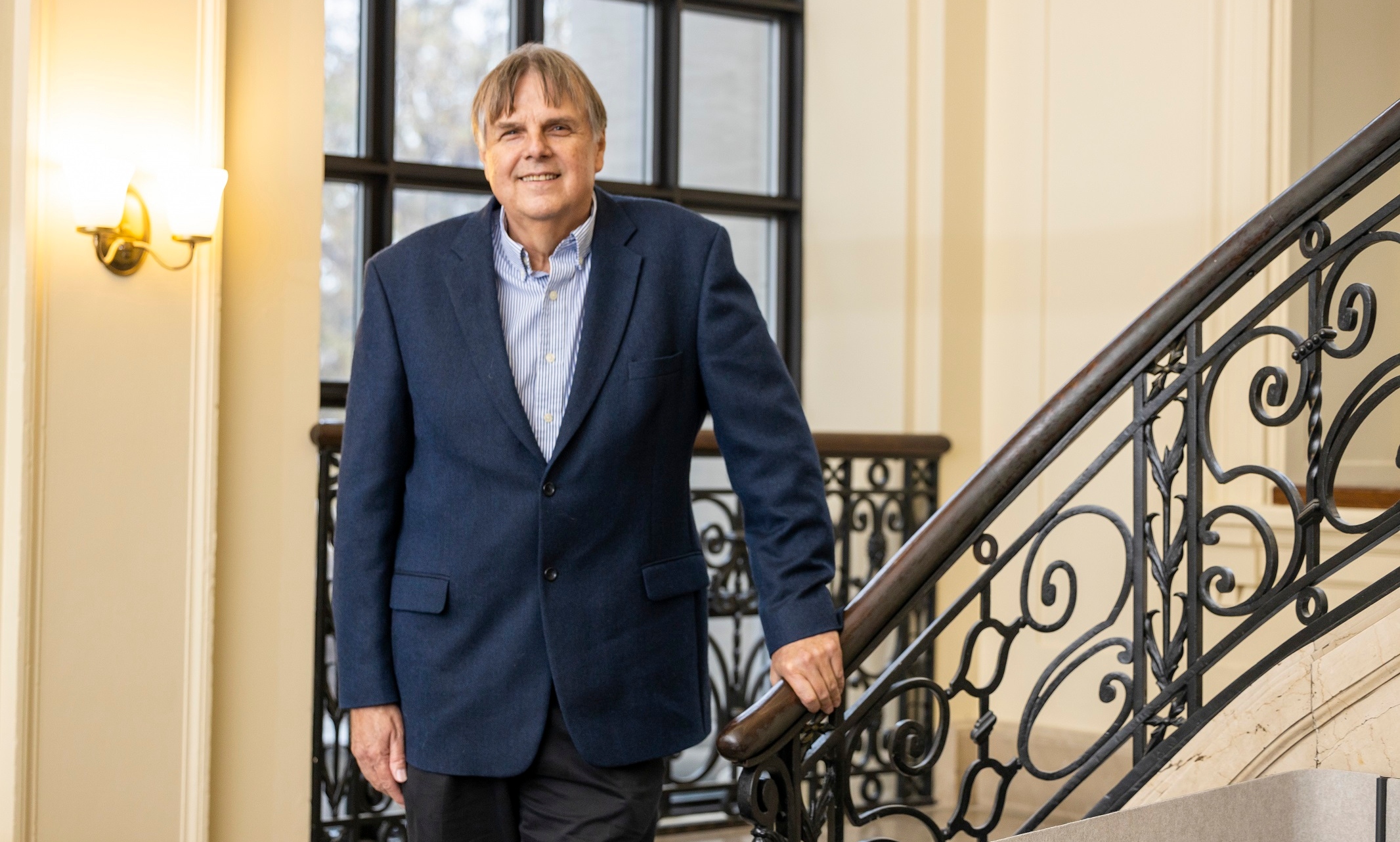
UMKC alumnus and physics professor honors father’s dedication
John Shaw, Jr., Ph.D. (M.S. physics ’76), watched his father go to night school and do his homework at the kitchen table to earn a college degree as he worked and raised a family.
Shaw, a retired physics professor, established a scholarship in his father’s name to give other students the opportunity for academic achievement.
“My father liked to be busy from the minute he got up in the morning to the minute he went to bed,” Shaw says.
John Shaw, Sr. took correspondence courses early in his career as a technician with the Federal Aviation Administration. When he became a FAA instructor, Shaw’s mother suggested that he attend night school.
“I never felt neglected by the fact that he went to school,” Shaw says. “When I was young, he would play catch with me, and read to me and my sister before we went to bed at night.”
In addition, Shaw’s father, who was the first person in his family to graduate from college, was teaching him the value of education and perseverance through his own academic goals. He graduated from college two months before Shaw turned twelve. When Shaw’s father retired, he was deputy regional director for the FAA.
“When I asked him of all the jobs that he had, which was his favorite, he said, ‘Teaching,’” Shaw says.
“Urban universities offer opportunities that are out of reach for other schools. If you’re in Kansas City, the large employer base means it’s easier to get a job while you go to school." - John Shaw, Jr.
This is something Shaw and his father had in common. By the time Shaw started college, he knew that he wanted to earn his doctorate and be a college professor; he taught physics at Northwest Missouri State until he retired in 2016.
“Seeing my dad graduate was an extremely important event in my life,” he says. “I’d always loved learning, but when I saw him graduate and the professors in their full regalia, I began to realize that there was more to education than I’d realized. That was when I became more goal oriented.”
Shaw is a proponent of urban higher education. He says that people may not understand that even students who receive scholarships and aid struggle to meet the financial demands of college.
“Urban universities offer opportunities that are out of reach for other schools,” he says. “If you’re in Kansas City, the large employer base means it’s easier to get a job while you go to school. My father wouldn’t have been eligible for a scholarship in that situation. Urban universities offer paths to education with which rural schools can't compete.”
Nov 09, 2022
Conservatory graduate Douglas Enderle makes surprise announcement at Crescendo reception
Douglas Enderle (M.F.A. '81), the 2010 UMKC Alumnus of the Year, has endowed two new scholarships for UMKC Conservatory students, honoring two longtime friends.
The Debra Joan Tucci scholarship will be awarded to a student in the Edelman Graduate Certificate in Performing Arts Management program. The Pamela Ann Carver scholarship will be awarded to a student majoring in Costume Design, the field in which Enderle built a stellar, Emmy-winning career as a senior costume designer for Walt Disney Entertainment.
Enderle said he read an item in the E-Roos alumni newsletter about the new Performing Arts Management program, intended to prepare students for management positions at not-for-profit performing arts organizations. It immediately made him think of Tucci, a friend of more than 30 years, “who was always willing to help me in whatever I needed to do.”
“I thought, what better thing could I do than to endow a scholarship in her name,” Enderle said. He decided to add a second scholarship in honor of Carver, who hired him to launch his career at Disney.
“She has guided me throughout my career,” he said of Carver. “I thought this would be a good way for me to give back.”
He is endowing the scholarships at UMKC because of the strong relationships he has formed here over the years, starting with Vincent Scassellati, the professor of costume design who hired Enderle as a graduate assistant. When Enderle was nominated for Alumnus of the Year in 2010, he formed new bonds with several people, particularly Curt Crespino, vice chancellor for external relations and constituent engagement; and Karen English, director of advancement for the School of Humanities and Social Sciences.
“These people have been instrumental in making my relationship with UMKC a huge success,” Enderle said. “They are the people who give of themselves. They are gems in this world, and that resonates with me because it seems that there are fewer and fewer of them to be found these days.”
Nov 08, 2022
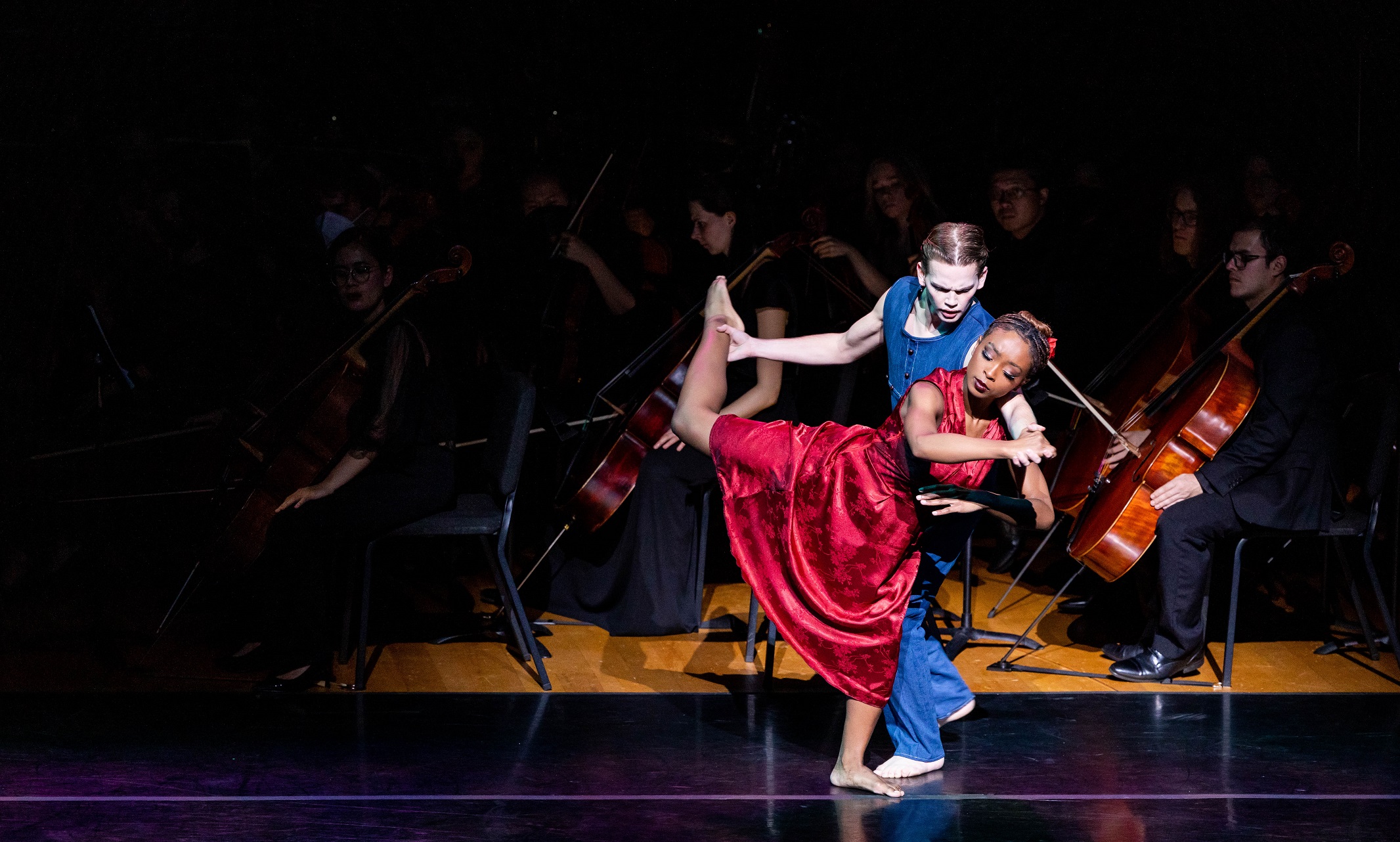
Annual benefit performance is the Conservatory’s largest fundraising event
The 2022 Crescendo event raised more than $650,000 to support Conservatory student scholarships. Approximately 1,000 people attended the gala and performance Friday evening.
Crescendo is a collage-style show, with performances from musicians, dancers and actors. Each piece flows into the next as a continuous performance. This year’s Crescendo included jazz, a strings solo, a piano solo, opera, dance, singers, various ensembles, a scene from the film “The 39 Steps” and more.
“The Crescendo performance is the ultimate exercise in team effort,” said James Snell, Ph.D., associate dean for performance. “We start planning about one year out. In August, we establish the program repertoire and students begin to work on their pieces.”
More than 250 students, faculty members and alumni performed in the show, held in the Kauffman Center for the Performing Arts. This was the 26th annual Crescendo event.
Alumni performers this year included trumpeter Hermon Mehari, operatic bass Scott Conner, operatic tenor Ben Gulley, pianist Crystal Jiang and dancer Caroline Dahm.
Nov 07, 2022
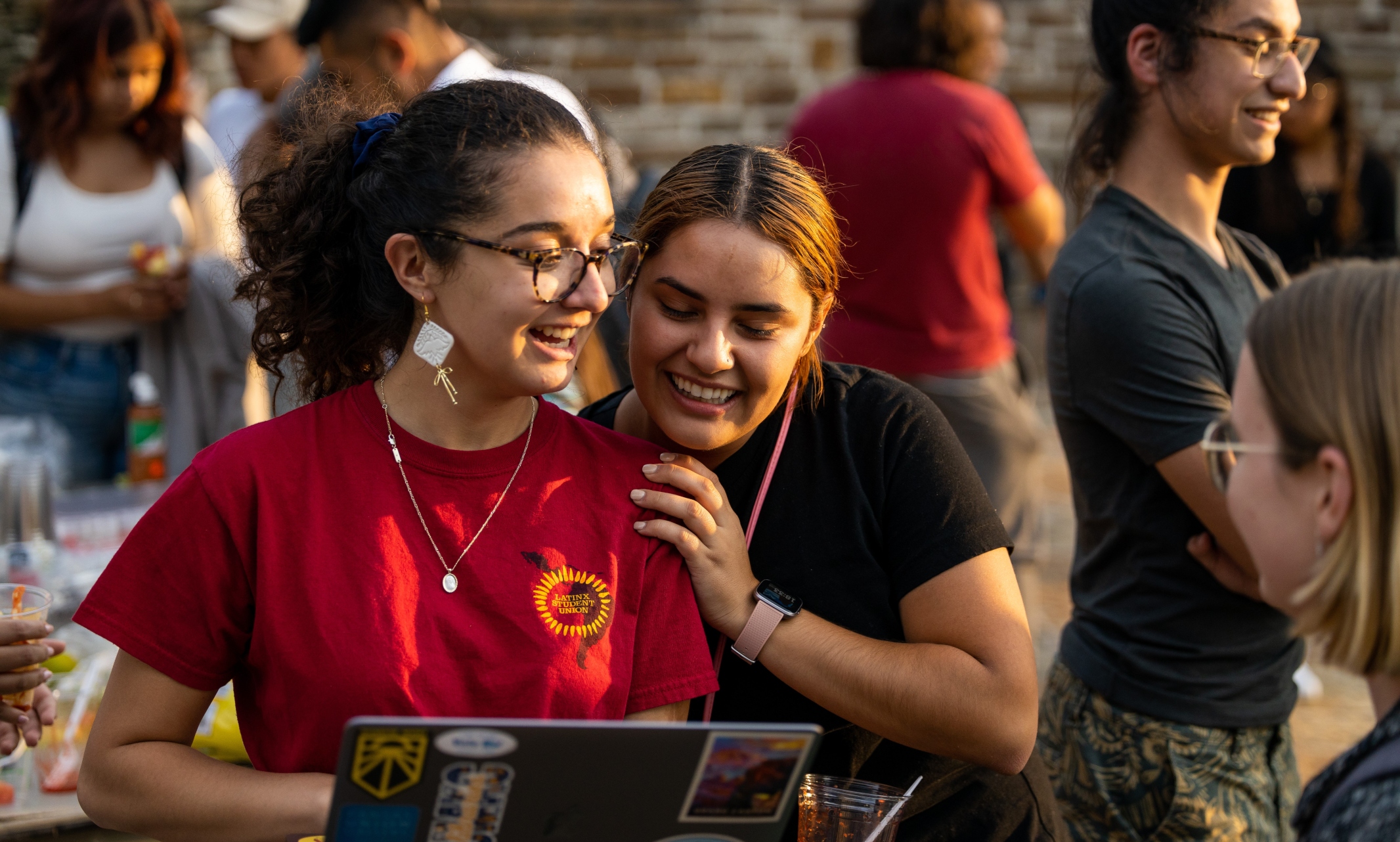
Greater Kansas City Hispanic Development Fund competition raises funds to support Latinx scholarships
The UMKC Latinx Student Union raised more than $18,000 to support Latinx college scholarships in the Cambio para Cambio fundraiser competition, hosted by the Greater Kansas City Hispanic Development Fund. UMKC LSU was the leading college team for the fifth year in a row.
Lauren Orozco, president, UMKC Latinx Student Union, is excited about her team’s accomplishments.
“The most important thing to me about raising money for scholarships is that it reflects that UMKC is a home for Latinx students. We say we are Kansas City’s university, but it's the connections people make – with students, faculty, staff and alumni – at UMKC that build our community. The Latinx Student Union has built a strong community within UMKC.”
To raise funds, Orozco and her team solicited community donations and raffled items that included a professional photo shoot, pumpkin patch tickets, AirPods and a 65-inch Roku television. They organized events, including a dance with a DJ in collaboration with the Latinx Education Collaborative, but Orozco was particularly excited that they were able to hold the Latinx Student Union Excelencia Breakfast this year.
“For half a decade we have provided scholarships that help make a home for Latinx students at UMKC. It shows that the students here care about providing a safe and welcoming space for Latinx students coming to the university.” - Lauren Orozco
“Even if we hadn’t raised the most funds this year, having the breakfast for our community was important to me. I felt the breakfast would be my legacy as president.”
Orozco says collaboration with UMKC LSU members and partners has been critical to their success in raising funds for Cambio para Cambio.
“Café Ollama, a Latinx owned coffee shop, did a promotion for us. I think that speaks to how present UMKC is in the community, especially with Latinx students. UMKC is home to so many different types of people, and being in the heart of the city makes it even more diverse.”
She thinks providing scholarships for Latinx students is both important and exciting.
“For half a decade we have provided scholarships that help make a home for Latinx students at UMKC. It shows that the students here care about providing a safe and welcoming space for Latinx students coming to the university.”
Alex Perez (M.A. ’17), director of scholarship program at the Hispanic Development Fund, says Cambio Para Cambio funds two-thirds of the scholarships the organization awards, but the impact is even broader.
“For many of our scholars, these scholarships provide hope and validation,” Perez says. “We are sending a message that their community has their back and supports their academic goals. All Cambio funds are raised with so much love, bringing to light the philanthropic power the Latina/o/x Hispanic community has when we come together.”
The Greater Kansas City Hispanic Development Fund developed Cambio para Cambio (Change for Change) in 2017 to support college scholarships for Hispanic students. In 1984, HDF awarded $100 scholarships to 100 students. This year the organization raised $425,984 to support scholarships that they will award this spring.
Nov 02, 2022
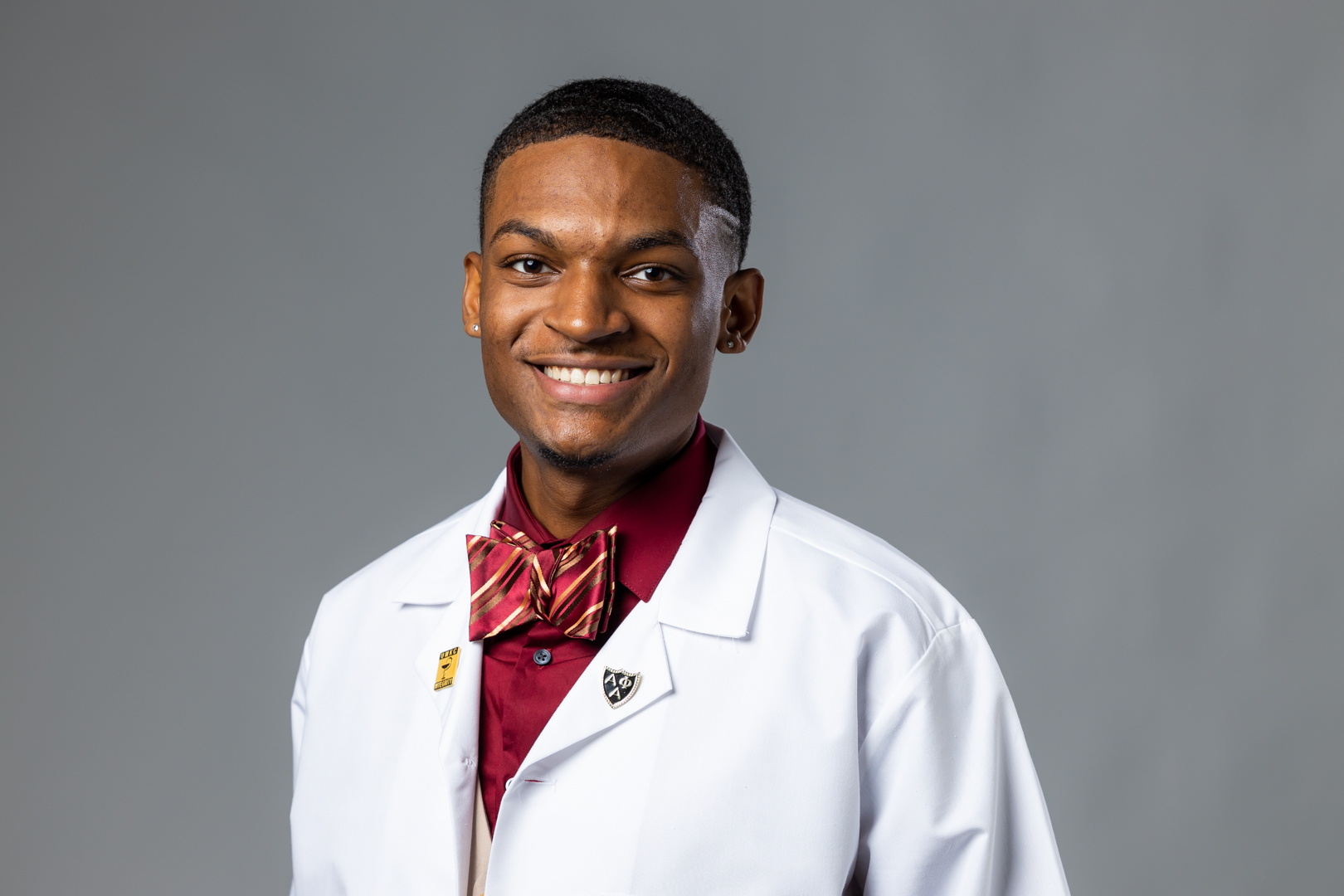
Rewards come from caring for patients and connecting with colleagues
Roos don’t just dream, they do. Our students turn ideas into action every day. Get to know our people, and you’ll know what UMKC is all about.
Calvin FlemonsAnticipated graduation: 2025Academic program: PharmDHometown: St. Louis
Why did you choose UMKC?
I initially chose UMKC for two reasons: It was close to home, and it had a six-year pharmacyprogram compared to seven years at many other universities. I wanted to attend a universitythat was affordable and would allow me to get away from home, but not too far. UMKC isthe perfect distance that allows for independence and a college experience. The six-yearprogram was the big ticket that drew me to campus because I could obtain my PharmD in lesstime and for less money!
Why did you choose your field of study?
Believe it or not, I did not always want to become a pharmacist. Originally, I wanted to become an engineer, but the math courses made me rethink my decisionquickly. However, I still liked math and also loved helping and caring for people. Afterresearching a multitude of careers in healthcare, I felt that pharmacy gave me that perfectbalance.
What are the challenges of the program?
No program is easy, but I would say time management and the heavy course load is challenging. In pharmacy school, there are some weeks when you have three exams, quizzes and homework all due in the same week. It never slows down. The load of the material and amount of studying is the most rewarding, but also the most challenging. You must figure out how to study effectively and utilize all your time efficiently.
What are the benefits of the program?
The biggest benefit of the PharmD program is knowing all this material will equip you to carefor patients in the future. Knowing that people’s lives will be in your hands makes you excitedto learn new things every day and to challenge yourself to a new level. Another benefit ishaving the opportunity to work alongside other programs on the Health Sciences campus. Getting to interact with medical, dental and nursing students allows me to see multiple aspects of healthcare and how we all fit into this large puzzle.
How has your college program inspired you?
My college program has inspired me to never give up and to not only represent myself, but allthose around me and coming after me. Attending a PWI (predominantly white institution),feeling like you belong and feel included can be a challenge sometimes. In this program thereare very few students who look like me, so I am inspired to encourage other students of colorto go into healthcare. Our representation is vital, and if my presence can help someone elsefeel inspired or interested in healthcare, then I am doing my part.
Since entering college, what have you learned about yourself?
Comparing freshman year to me today is a 0 - 100 experience. During my journey in school, Ihave learned that I am very ambitious and want to get the most out of my experience here. Ilove being involved and interacting with others on campus whether it is students, faculty oradministration. I have also learned that I am - and want to continue to be - impactful on and offcampus. I believe the best way to make an impact is to give back and serve those around you.Through my time working with organizations, I learned that I could impact and help those around me,which is very fulfilling.
Are you a first-generation college student? If so, what does that mean to you?
I am not a first-generation college student, but I am a first-generation pharmacy student. Mymother and father paved the way for me and my sister, and education has always been important. Being a first-generation pharmacy student however means everything to me because I amdoing this for myself, my family and my community. Knowing that Black men in healthcare arescarce, we need more of us to represent and make an impact and difference. Having theknowledge to improve and possibly change someone’s life is mind-blowing and I am gratefulevery day of the journey.
Who/What do you admire most at UMKC and why?
I admire all of the student leaders that I get the privilege to work alongside. Seeing thesestudents show up to the task every time with no complaints and still uphold their academicsis motivational. There are many students who have taught me so much during my journey and Ihope to do the same for others around me.
What other extracurricular activities are you involved in at UMKC?
I am very involved on both the Volker campus and Hospital Hill campus at UMKC. Being a partof these organizations allows me to challenge myself and give back to my campus and community! I am involved in 7 organizations: President of Alpha Phi Alpha Fraternity, Inc. – Delta Rho Chapter; Vice-President of The National Society of Leadership and Success; President-Elect of The Student National Pharmaceutical Association; UMKC STAHR Ambassador; Treasurer of The Student College of Clinical Pharmacists; Treasurer of Black Student Pharmacists Organization; Financial Recorder of National Pan-Hellenic Council.
What do you hope to take from your experiences at UMKC into your professional career?
I hope to make new connections with other UMKC students and faculty around me. I believe that lifelong connections with others is more important than any amount of coursework you could learn.
Nov 02, 2022
While the Federal Communication Commission estimates that 16 million people in rural America go without broadband Internet access, that number may ...
Researchers Nick Mathews, assistant professor of digital journalism at the University of Missouri-Kansas City, and Christopher Ali, the Pioneers Chair in Telecommunications and Professor of Telecommunications in the Bellisario College of Communications at Pennsylvania State University, conducted 19 interviews with families in a rural county in the East Coast who lacked adequate broadband connections. Read more.
Nov 02, 2022
